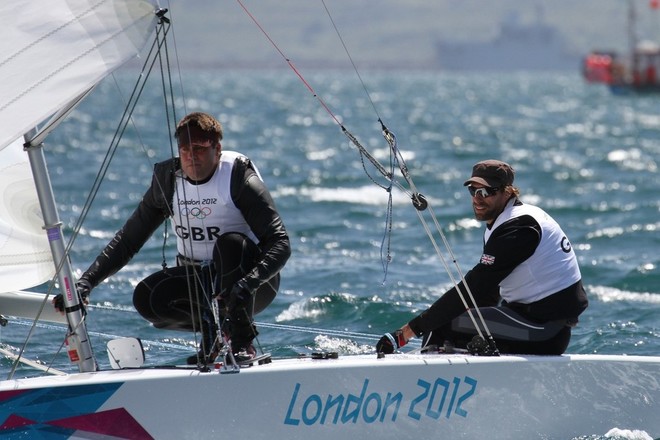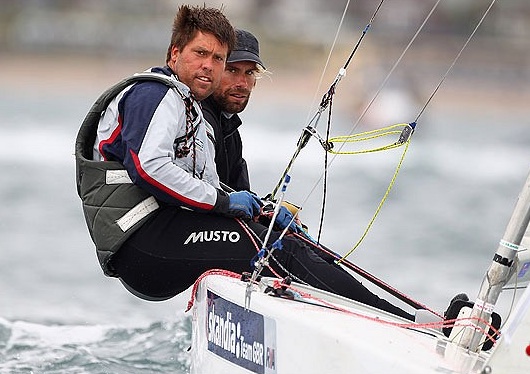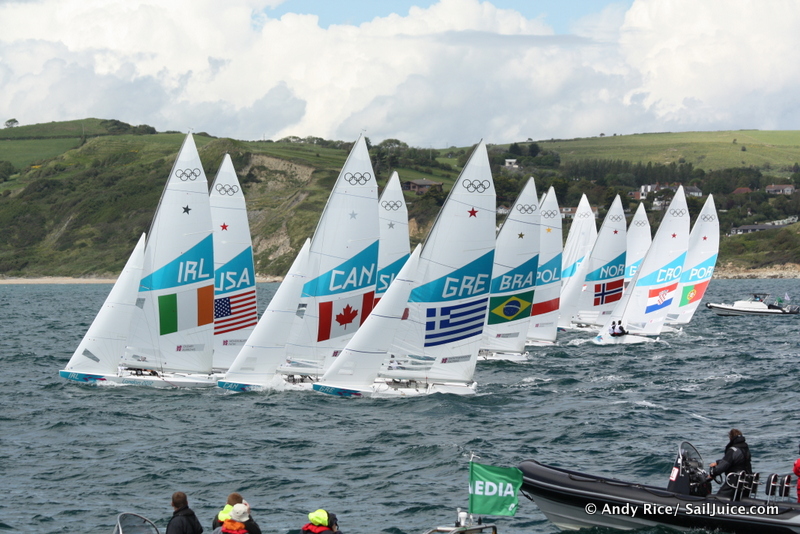Roll Tacks - July 2012
Was the Olympic regatta a success? Yes, of course it was! It would be churlish to suggest otherwise. But before we can answer the question, we really need to consider whose point of view we’re talking about.
If you’re looking at it from Team GB’s point of view, then five medals from such a high achieving team was about where we expected to be, although there was a sense of deflation at winning a very respectable one gold and four silvers. This was probably because three of those silvers came so close to turning to gold. But in reality, who can complain about such a medal haul? It’s a medal haul that the likes of Italy, Germany, Russia and the USA would have killed for.
In fact, when you look at the desperate measures that Russia turned to in order to try and regain a chance of winning a bronze medal from Finland in the women’s match racing, you begin to wonder if murder really was on the agenda. It was unusual enough to have an on-the-water protest immediately after the bronze-deciding match race had gone in Finland’s favour. But then to pursue the matter afterwards with the Court of Arbitration for Sport in Switzerland, well that really does take the biscuit.
Anyway, to return to the question of whether or not this was a successful Olympic Regatta, let’s think about some of the other points of view involved. On the subject of that match race, I was fortunate enough to be given a couple of tickets by a British 470 sailor to go to the ticketed area at the Nothe for the very final day of the regatta. To be honest, having already been reporting from the media centre in Portland for the past fortnight, I was more than ready to go home. There was, sadly, no British interest in the final day, but I had heard such great things about Ben’s Nevis - as the Nothe came to be known - that I felt compelled to go.
Word was that a survey of spectator satisfaction across the whole Games revealed that the Nothe was polling at the very top. For a sport that is not considered to be good spectator fodder, and typically polls at the bottom of any measure of media interest, that is an incredible statistic. To be honest, I still struggle to believe that sailing - even on a very good day - can live up to the drama of an evening of athletics in the Olympic Stadium.
But anyway, I decided to go along with fellow sailing journalist Matthew Sheahan to find out what all the fuss was about. I have to say I was pleasantly surprised. Nothe commentators Andy Green and Hannah White were doing a great job of geeing up the audience, getting us to do Mexican waves and cheering for the sailors every time a boat rounded a mark of the course.
It was the first time in the whole fortnight that the wind had blown from the south-east, which meant blowing onshore, allowing for much steadier winds and much bigger waves then we had seen in any of the other medal races. And the match racing - I have to admit - was pretty darn entertaining. If you have paid attention to my views on match racing before, you’ll know that I never rated it as an Olympic event. And for all sorts of reasons - in terms of how it fits (or doesn’t) with the whole ISAF World Cup structure, how it has failed to attract more women into Olympic sailing, and so on - I stand by my general view. But if I base my observations entirely on what I saw that day, from the point of view of a spectator having a picnic on the Nothe course, it was a great afternoon’s entertainment.
The Australian match race team looked to have the measure of the Spanish crew, but some major errors, not least helmsman Olivia Price falling out of the boat during a wild broach and having to be recovered by her crew, meant it was Tamara Echegoyen and her team who became the surprise winners of the gold medal.
So from a live spectator’s point of view the Nothe course was undoubtedly a big success, and sailing has taken a big step forward in terms of its spectator appeal. But were the vagaries of the Nothe course a price worth paying by the sailors? I received a number of emails from friends and sailing fans who believed the randomness of the racecourse was a step too far. The success of the Nothe has created an interesting dilemma for the sport. How far do you go to appeal to spectators, and how far should the purity of the sport be compromised?
It’s only when you’ve won a gold medal on a course like that that you really have the credibility to be able to speak out against it, and it was interesting to note that Ben Ainslie said he was glad that he would never had to race on the Nothe again, having just won the gold medal by the narrowest of margins. Iain Percy and Bart Simpson lost the gold medal by just two seconds across the finish line of the Star medal race, and they didn’t complain about the course. It would have sounded like sour grapes if they had, although we would have understood and sympathised.
Personally, and it’s easy for me to say, I think the Nothe course was a price just about worth paying. And to be honest, the sailors had better get used to it. Where Weymouth had the wind shadow of the Isle of Portland (495 feet at its highest point) and Wyke Regis, the medal race area in Rio 2016 will have 1,299 feet of Sugarloaf Mountain.
If you’re looking at it from Team GB’s point of view, then five medals from such a high achieving team was about where we expected to be, although there was a sense of deflation at winning a very respectable one gold and four silvers. This was probably because three of those silvers came so close to turning to gold. But in reality, who can complain about such a medal haul? It’s a medal haul that the likes of Italy, Germany, Russia and the USA would have killed for.
In fact, when you look at the desperate measures that Russia turned to in order to try and regain a chance of winning a bronze medal from Finland in the women’s match racing, you begin to wonder if murder really was on the agenda. It was unusual enough to have an on-the-water protest immediately after the bronze-deciding match race had gone in Finland’s favour. But then to pursue the matter afterwards with the Court of Arbitration for Sport in Switzerland, well that really does take the biscuit.
Anyway, to return to the question of whether or not this was a successful Olympic Regatta, let’s think about some of the other points of view involved. On the subject of that match race, I was fortunate enough to be given a couple of tickets by a British 470 sailor to go to the ticketed area at the Nothe for the very final day of the regatta. To be honest, having already been reporting from the media centre in Portland for the past fortnight, I was more than ready to go home. There was, sadly, no British interest in the final day, but I had heard such great things about Ben’s Nevis - as the Nothe came to be known - that I felt compelled to go.
Word was that a survey of spectator satisfaction across the whole Games revealed that the Nothe was polling at the very top. For a sport that is not considered to be good spectator fodder, and typically polls at the bottom of any measure of media interest, that is an incredible statistic. To be honest, I still struggle to believe that sailing - even on a very good day - can live up to the drama of an evening of athletics in the Olympic Stadium.
But anyway, I decided to go along with fellow sailing journalist Matthew Sheahan to find out what all the fuss was about. I have to say I was pleasantly surprised. Nothe commentators Andy Green and Hannah White were doing a great job of geeing up the audience, getting us to do Mexican waves and cheering for the sailors every time a boat rounded a mark of the course.
It was the first time in the whole fortnight that the wind had blown from the south-east, which meant blowing onshore, allowing for much steadier winds and much bigger waves then we had seen in any of the other medal races. And the match racing - I have to admit - was pretty darn entertaining. If you have paid attention to my views on match racing before, you’ll know that I never rated it as an Olympic event. And for all sorts of reasons - in terms of how it fits (or doesn’t) with the whole ISAF World Cup structure, how it has failed to attract more women into Olympic sailing, and so on - I stand by my general view. But if I base my observations entirely on what I saw that day, from the point of view of a spectator having a picnic on the Nothe course, it was a great afternoon’s entertainment.
The Australian match race team looked to have the measure of the Spanish crew, but some major errors, not least helmsman Olivia Price falling out of the boat during a wild broach and having to be recovered by her crew, meant it was Tamara Echegoyen and her team who became the surprise winners of the gold medal.
So from a live spectator’s point of view the Nothe course was undoubtedly a big success, and sailing has taken a big step forward in terms of its spectator appeal. But were the vagaries of the Nothe course a price worth paying by the sailors? I received a number of emails from friends and sailing fans who believed the randomness of the racecourse was a step too far. The success of the Nothe has created an interesting dilemma for the sport. How far do you go to appeal to spectators, and how far should the purity of the sport be compromised?
It’s only when you’ve won a gold medal on a course like that that you really have the credibility to be able to speak out against it, and it was interesting to note that Ben Ainslie said he was glad that he would never had to race on the Nothe again, having just won the gold medal by the narrowest of margins. Iain Percy and Bart Simpson lost the gold medal by just two seconds across the finish line of the Star medal race, and they didn’t complain about the course. It would have sounded like sour grapes if they had, although we would have understood and sympathised.
Personally, and it’s easy for me to say, I think the Nothe course was a price just about worth paying. And to be honest, the sailors had better get used to it. Where Weymouth had the wind shadow of the Isle of Portland (495 feet at its highest point) and Wyke Regis, the medal race area in Rio 2016 will have 1,299 feet of Sugarloaf Mountain.
Related Articles

Bart Simpson Interview - Part 2
Read More

By the end of 2002, Bart’s sailing and his results had gone downhill. “I ended up trying to beat Ben rather than trying to sail my best.” He took himself to a psychologist. “I wasn’t thinking the right things. He taught me to refocus on sailing the best you can rather than trying to beat anyone else. He helped get my brain back on track, and I made some steps forwards, focusing on improving my own performance rather than worrying about anyone else.”

Bart Simpson Interview - Part 1
Read More

Could there be any reason to believe that a team that had just finished 52nd in the Star World Championships had any hope of winning a medal at the Olympic Games later in the year? On the face of it that question seems like a no-brainer. How could any team have serious designs on a top three at the Games, let along winning gold? But if you know that the team in question is Iain Percy and Andrew Simpson, and you know anything of what these sailors have achieved, then you might change your view.

Roll Tacks - October 2013
Reporting at the Seiko 49er World Championships in Marseille gave me the chance to catch up with Nathan Outteridge who was fresh from his rollercoaster year in San Francisco as helmsman of Artemis Racing’s AC72.
Read More

Roll Tacks - September 2013
I can’t decide whether or not the unique language in sailing that we use is a good thing. The constant dumbing-down of sailing for TV audiences drives me crazy, because I think if the audience is sufficiently interested, they’ll take the time to find out what a ‘violent luff’ or a ‘Chinese gybe’ is. I don’t know about you, but I can watch and enjoy a football or rugby match without necessarily understanding every nuance or subtlety of the game.
Read More

Shooting Stars and Photo Finishes
 Read More
Read More
Halfway through the opening Star race, the Germans had a beautiful lead with defending Olympic champions Iain Percy and Bart Simpson looking comfortably in the top three as they sailed up the second beat.....
